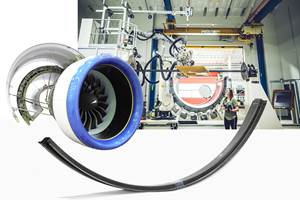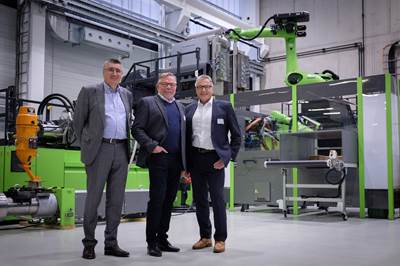Injection molding expertise achieves composites mobility innovation
JEC World 2025: A partner in three JEC Award products, Engel demonstrates how its injection molding equipment can set new benchmarks in applications like bike handlebars and interior vehicle components.
Bicycle handlebar. Source (All Images) | Engel GmbH
Through involvement in three products selected as JEC Innovation Award finalists, Engel GmbH (Schwertberg, Austria) demonstrates the capabilities of its injection molding technologies made for lightweight part construction. Among those on display is the live production of a bicycle handlebar for Canyon Bicycles. Another key exhibit at Engel’s booth includes a truck storage compartment flap, which was named one of the winners of this year’s JEC Award.
The bicycle handlebar is manufactured via a tie-bar-less Engel Victory 180 injection molding machine, which combines fluidmelt and organomelt technologies with continuous fiber-reinforced semi-finished materials. The fluidmelt process enables the production of hollow structures through the injection of water or nitrogen. During the process, the core’s molten core is displaced into an overflow cavity or back into the plasticizing unit, creating a hollow space within the part. At JEC World, the process is being demonstrated using gas injection and overflow cavities. Once the cooling phase is complete, the hollow handlebar can be removed from the mold. Thanks to its geometry, this method can achieve very lightweight structures with high bending and torsional stiffness.
According to Engel, use of continuous fiber-reinforced semi-finished materials further enhances the mechanical properties of the bicycle handlebar. While the components themselves are made of glass fiber-reinforced polyamide 6 (PA6), integration of four unidirectional (UD) carbon fiber tapes, which are placed into the mold during injection molding, ensures that the part can withstand high loads despite being a thin-walled and hollow structure. Engel says the handlebar represents an advancement over traditional aluminum and thermoset options.
The composite handlebar was a collaborative effort with the follow companies:
- Canyon Bicycles played a key role with its expertise in conceptualization and functional design, ensuring the handlebar met the high demands of professional cyclists.
- Artefakt Design was responsible for the handlebar’s aesthetic design, which ensured functionality while still being visually appealing.
- Domo Chemicals supplied the injection molding compound and necessary composite tapes for production.
- Plastic Innovation handled the mechanical component design as well as process and structural simulation.
- Simoldes, as the toolmaker and series producer, contributed its extensive knowledge in mold manufacturing and component production to ensure a high-quality and reproducible handlebar process.
The Victory 180 wide-platen system showcased in this production is specifically designed for large, complex components or molds within compact machine dimensions. This is thanks to its tie-bar-less design and a spacious open mold area. An enlarged platen offers an additional 100 mm in width compared to standard models.
Storage compartment flap.
The second award highlight is the storage compartment flap for Daimler Trucks, developed by Fraunhofer IMWS. This flap features a visually appealing, full-width edge and a closed, all-around edge, both of which are created in a single step along with the core and structural formation. This places high demands on the precision of the injection molding process and the machine’s ability to deliver accurate and reliable results, even under high material stress.
The component was manufactured as a sandwich part on an Engel injection molding machine and is the result of thermoplastic sandwich molding technology developed at Fraunhofer IMWS. In this process, semi-finished materials — a thermoplastic honeycomb core and fiber-reinforced thermoplastic UD tape laminates from project partner ThermHex — are thermoformed and can be functionalized via injection molding in the same process. The continuous and fully automated manufacturing process is designed for high-volume production. Engel notes that this is particularly crucial for the automotive industry, where large production volumes and short cycle times are essential.
The storage compartment flap is said to demonstrate how modern lightweight technologies and the right choice of machinery can revolutionize the production of vehicle interior components. Such products enable significant weight reduction while simultaneously enhancing structural integrity. This manufacturing technique helps lower COâ‚‚ emissions and minimize material consumption, making it an environmentally friendly and efficient solution for the automotive industry.
Visit Engel at Booth L106 in Hall 5.
Related Content
Carbon fiber composite pallet revolutionizes freight industry
LOG Point Pallet fuses advanced materials with innovative design and manufacturing to improve supply chains worldwide.
Read MoreIndustrializing additive manufacturing in the defense/aerospace sector
GA-ASI demonstrates a path forward for the use of additive technologies for composite tooling, flight-qualified parts.
Read MoreActive core molding: A new way to make composite parts
Koridion expandable material is combined with induction-heated molds to make high-quality, complex-shaped parts in minutes with 40% less material and 90% less energy, unlocking new possibilities in design and production.
Read MoreThe potential for thermoplastic composite nacelles
Collins Aerospace draws on global team, decades of experience to demonstrate large, curved AFP and welded structures for the next generation of aircraft.
Read MoreRead Next
Fraunhofer commissions automated Engel production cells for thermoplastic composite R&D
Fraunhofer PAZ pilot plant center installs v-duo 700 vertical machine and duo 900 injection molding machine to combine thermoplastic composite processes with a variety of injection molding technologies.
Read MoreThe pursuit of energy efficiency in composites manufacturing
In an increasingly energy-driven world, technology developments are being sought after to reduce energy consumption in composites manufacturing, further translating into waste reduction and other efficiencies.
Read MoreScaling up, optimizing the flax fiber composite camper
Greenlander’s Sherpa RV cab, which is largely constructed from flax fiber/bio-epoxy sandwich panels, nears commercial production readiness and next-generation scale-up.
Read More












